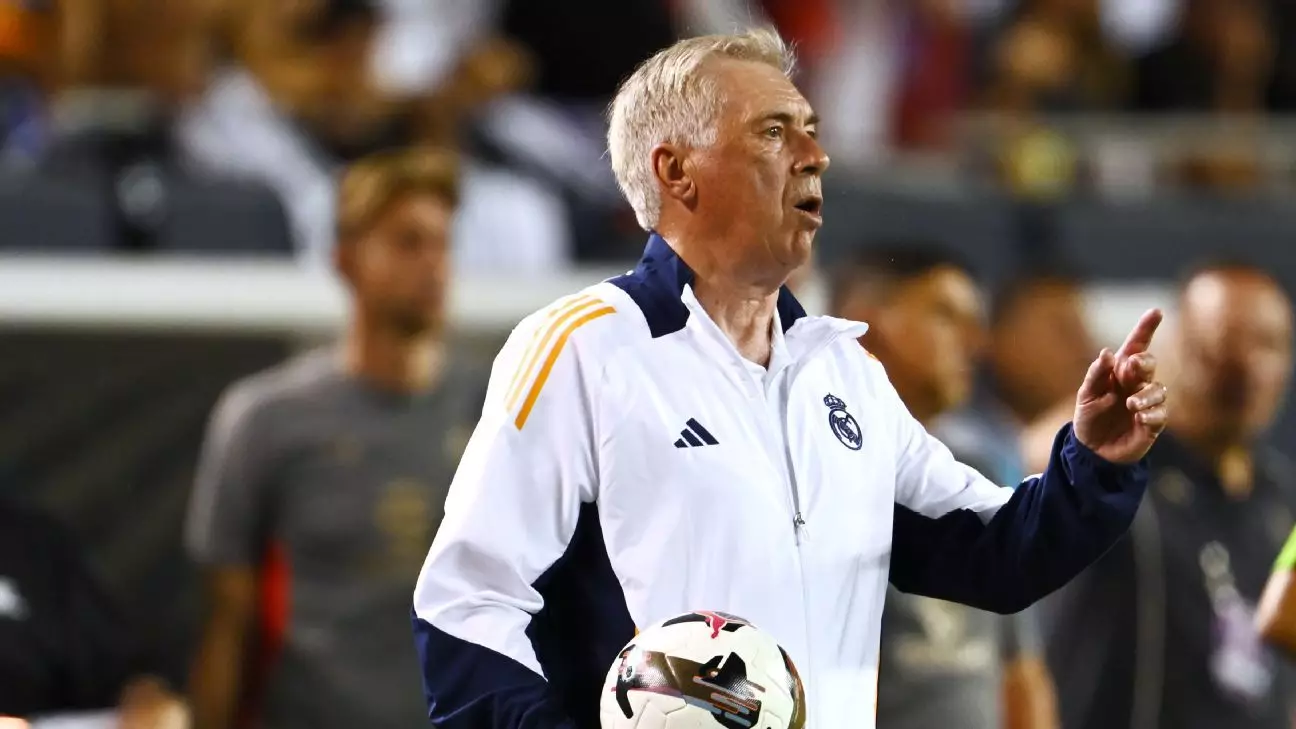In recent conversations surrounding the modern football landscape, Real Madrid’s manager Carlo Ancelotti has raised a crucial and often overlooked concern: the fatigue of players amid an increasingly congested schedule. The expansion of competitions such as the Champions League and Club World Cup has led to the potential for elite players to participate in nearly 85 games within a single season. This staggering number not only raises questions about the integrity of the sport but also significantly impacts player health and performance. Ancelotti’s assertion that players might consider salary reductions in exchange for fewer fixtures highlights a shift in priorities that could reshape the future of football.
As international competitions continue to multiply and the demand on players escalates, it’s not surprising that fatigue-related complaints have surfaced among professionals. Manchester City’s Rodri has voiced serious concerns, suggesting that players may soon resort to strike action if the workload persists without viable solutions. The gravity of such discussions cannot be underestimated, as they signal a potential tipping point in the relationship between athletes and the governing bodies of football.
The Call for Reflection and Adaptation
Ancelotti’s comments during a recent press conference reflect a pressing need for the football community to engage in self-reflection regarding the implications of an overloaded calendar. While it’s clear that the marketability of football has its place, the welfare of athletes must not be compromised. Injuries, fatigue, and mental health issues are on the rise as players attempt to juggle numerous commitments. Ancelotti’s poignant remark, “Football needs to reflect because the aim is to try to play less games to have less injuries,” underscores the fundamental reality that reducing game frequency could lead to a healthier and, ultimately, more competitive sport.
He further emphasized the importance of player input, suggesting that proactive measures must be taken to consult athletes about their experiences and needs. With concerns from players gaining traction, there’s an opportunity for unity within the league to advocate for a modified approach to scheduling that prioritizes player health alongside the financial interests of clubs.
Amid these pressing issues, Ancelotti also assessed Real Madrid’s on-field performance as they prepared for a match against Espanyol. His acknowledgment of the team’s current form reflects a broader challenge in balancing player performance with their physical limits. The visible struggle expressed through matches—like the hard-fought 3-1 victory against Stuttgart—illustrates the dichotomy between achieving results and maintaining peak physical condition.
The coach’s insight that the team is not yet at its best but is in a normal transitional phase for the season conveys the understanding that progress takes time. As LaLiga unfolds, with Madrid currently sitting third, the path to improvement is measured and requires patience. Ancelotti’s recognition that the squad’s peak performance typically aligns with October or November resonates with fans’ expectations while reminding them that development is incremental and sometimes imperceptible.
On a tactical note, the question of shifting to a four-man midfield was posed to Ancelotti, prompting an insightful response. He acknowledged that merely rearranging formations won’t automatically yield balance. “Balance is a collective work,” he stated, reflecting a philosophy that emphasizes teamwork and collective effort over structural changes. Such adaptability is essential as the team evolves and faces different opponents, requiring a cohesive strategy rather than a simplistic modification.
Ancelotti’s commitment to integrating young talents like Endrick and the anticipated return of Eduardo Camavinga from injury represent a forward-thinking approach. Bringing fresh energy into the squad not only signifies faith in the younger generation but also ensures that injuries and fatigue can be managed through rotation. By recognizing the value of these players, Ancelotti is laying the groundwork for a resilient Madrid team capable of navigating the relentless demands of modern football.
Carlo Ancelotti’s reflections on player health amid an expanding football calendar serve as a call to action for stakeholders at all levels. It is imperative that the sport adapts to ensure the longevity of its greatest assets—its players. It would be prudent for clubs and governing bodies to prioritize athlete welfare to maintain the integrity and excitement that has defined football for generations. As the dialogue continues, the focus must remain on creating a sustainable environment that fosters both individual and collective success.

